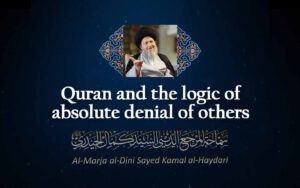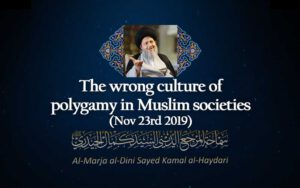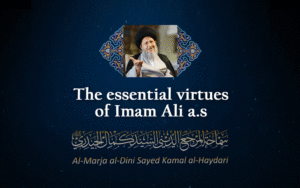1067 words, approximate reading time 8 min
One of the accepted facts by most of the Shia scholars is that if a verse of the Quran contradicts with definitive commands of intellect, it is correct to leave the literal meaning of the verse and find the Taʿwīl (esoteric commentary) of the verse and justify it in a way that is not against the literal meaning of the verse and instead extends it.
For example, when faced with verses such as
يد الله فوق أيديهم
The hand of Allah is over their hands. (Surah Fath, v. 10)
And
کل من علیها فان و یبقی وجه ربک ذو الجلال و الاکرام
“Everyone upon the earth will perish, and there will remain the face of your Lord, Owner of Majesty and Honor.” (Surah al-Rahman, v 26-27) etc.
that have signs of a bodily appearance of God (face and hands), the Mufassirin leave the literal meaning of the verses and present a Taʿwīl that is not against the basic commands of reason and intellect. In other words, they try to create a sort of compatibility and consistence between the literal meaning of the verse and basic commands of reason because of a theological prefiguration that there is no contradiction and inconsistency between “reason” and “religion.”
Now, according to what is mentioned above, we need to ask this question about another field of man’s achievement that if the literal meaning of a verse contradicts with the definite findings of experimental sciences, what should we do? Should we stick to the literal meaning of the verse and reject the result of the experimental observations? Or should we leave the literal meaning of the verse and present an exegesis or Taʿwīl in a way that is not in contradiction with the experimental observations, which have of course been concluded with a high level of reliability and definitiveness?
According to us, the second approach is correct; i.e. just like there is no contradiction between “religion” and “reason”, there is no contradiction between “religion” and “experimental evidences.” Therefore, if a scientific research passes the stage of hypothesis and becomes a theory or law, it is an intellectual and Shari’ argument and thus, should not be in contradiction with religious texts – both verses and narrations alike. A religious scholar should be able to create a compatibility and coherence between the literal meaning of the religious text and the findings of experimental sciences and finally present an understanding and explanation of religion so that not only should there be minimum faceoff between “religion”, “reason” and “human experience” but there should also be a sort of coherence and overlapping between them. For example, if we face a definite scientific theory in the field of medicine in a way that all doctors unanimously say that to cure a specific dangerous disease, the theory needs to be applied practically and we find the theory to be contradicting one of the verses of Quran, we cannot stay fixed to the literal meaning of the verse in such a place and try to save the literal meaning at any cost. In such cases we must Taʿwīl the verse and present a meaning that does not negate and reject the findings of science but in a way that does not go against the literal meaning of the verse as well and instead extend its meaning and supplement it.
Answer to a query
A query or question might arise here for some people that on one hand we are not supposed to ignore those scientific findings that the human life relies on and on the other hand we are faced with a problem that if we rely on these findings and understand and Taʿwīl the religious texts based on them; in such a case, if the scientific theories which have been widely accepted in a particular time period get refuted, what is our duty?
Is it possible to rely on theories that may be refuted or rejected after a time period? What if we reach a certain exegesis and Taʿwīl of Quranic verses based on a strong and definite scientific law and it gets refuted after some time and naturally, our understanding and exegesis of the verses becomes fundamentally null and void of value. What should we do in such cases?
In answer to this query we must say that a mere change of foundations in humanities and experimental sciences does not make them devoid of value because this very problem exists in all Islamic sciences including theology i.e. differences of opinion and change in fundamentals of various Islamic sciences is a natural and unavoidable thing owing to its human nature.
Which mystic, philosopher, theologian, jurist or Usuli can claim that there has not or will not be any changes in his thought system from the start of his academic life till its end?
We have so many examples in the history of Islamic sciences where Islamic scholars have changed their opinion. For example, a jurist gives a Fatwa initially but after contemplation and further research retracts from it and gives a new Fatwa.
Now, can we say that just because it is possible that some of the ideas and fundamentals in Islamic sciences might undergo a change or even be refuted, we cannot trust the findings of these sciences? No.
Therefore, apparently the solution to the problem is that the criteria used by a jurist, theologian or Mufassir in facing the literal meaning of the religious texts in regards to science, should be to act according to the certainty brought forth by these sciences in that particular time. If the foundations do not change, well and good, but if they do and are refuted one day, the jurist and theologian should look for a correct and definitive alternative in that time and accept it. The certainty of the religious scholars is an argument for them and even God does not expect them to do something out of their capacity. As a result being that a jurist, Mufassir and theologian have a duty to act on what they find to be correct with certainly according to their intellectual capacity and scientific progress in their own time and take the same to be a basis for the understanding, exegesis and Taʿwīl of the religious texts and they have no duty other than this



